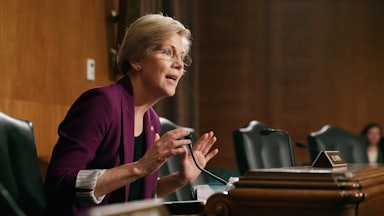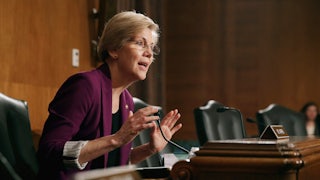If you’re a payday lender or a shady mortgage broker, you are probably having a pretty good week. The Fifth Circuit Court of Appeals ruled on Wednesday that the Consumer Financial Protection Bureau, a federal agency tasked with enforcing consumer finance laws, is unconstitutional. A three-judge panel of Trump appointees found in Community Financial Services v. CFPB that the agency’s funding structure violated the constitutional separation of powers.
Wednesday’s ruling could give the Supreme Court an opportunity to destroy a regulatory agency that conservatives and business groups have opposed since the moment of its creation. At risk are a wide variety of regulations to protect Americans from predatory financial practices and the primary vehicle to enforce most federal consumer finance protections. The CFPB’s fate now depends on a Supreme Court that has already signaled a deep antipathy toward the agency itself.
The Consumer Financial Protection Bureau was created in the aftermath of the global financial crisis in 2008 as part of the Dodd-Frank reforms for the American financial sector. At the time, Congress sought to consolidate all of the enforcement and regulation powers created by more than a dozen existing consumer finance laws within a single agency. The agency’s proponents, foremost among them then law professor Elizabeth Warren, hoped that the new structure would bolster those laws’ effectiveness in curbing a wide variety of frauds and abuses. CFPB regulations have since targeted unfair practices by mortgage lenders, credit card companies, for-profit colleges, student loan providers, and more.
Despite the agency’s mandate—or perhaps because of it—the CFPB has drawn strenuous opposition from business groups and their conservative allies from the start. Most of their criticism focuses on structural features of the agency that insulate it from pressure by lawmakers whose campaigns might be funded by industries under scrutiny by the CFPB. Then-Judge Brett Kavanaugh, for example, rose to prominence in conservative legal circles in part because of a D.C. Circuit opinion he wrote in 2016 that struck down a Dodd-Frank provision that only allowed the president to fire the CFPB director for cause, which he framed as a “threat to individual liberty.”
This case involves a challenge to payday-lending regulations by two industry groups. In 2017, the CFPB issued a new rule that sought to address “unfair” and “abusive” practices within that industry. The relevant component in this case barred lenders from making a third consecutive automated withdrawal request from a customer’s bank account if the first two failed because of insufficient funds. As part of the rulemaking process, the CFPB collected ample evidence that the practice was unfair and harmful because it could trigger a variety of bank-related fees on the consumer in question and even lead to the closure of their bank account. Since the requests are automated and can happen in quick succession, consumers might not be able to move funds around quickly enough to ensure the payment would be covered, the agency determined. The issue was particularly acute because payday lenders, by their nature, target lower-income customers.
The lenders challenged the new rule on a variety of grounds: that it violated federal laws that prohibit new regulations from being “arbitrary and capricious,” that the CFPB director’s appointment was unconstitutional at the time because of the for-cause provision, that Congress impermissibly delegated too much power to the agency, and that the agency’s funding structure was unconstitutional. A federal district court judge dismissed all four claims in 2020, and the Fifth Circuit panel did the same in Wednesday’s ruling—with just one exception.
Judge Cory Wilson, writing for the unanimous panel, concluded that the payday lenders were right about the CFPB’s funding structure. Many federal agencies are funded by regular appropriations from Congress. Some, like the Federal Reserve and the United States Postal Service, are generally not. One of them is the CFPB, which requests funds from the Fed’s operating budget and is automatically granted them within certain parameters. Those funds are then transferred to an account under the CFPB director’s control.
“So the Bureau’s funding is double-insulated on the front end from Congress’s appropriations power,” Wilson wrote, “and Congress relinquished its jurisdiction to review agency funding on the back end. In between, Congress gave the Director its purse containing an off-books charge card that rings up ‘[un]appropriated monies.’ Wherever the line between a constitutionally and unconstitutionally funded agency may be, this unprecedented arrangement crosses it.”
This is not the first time that this concern has cropped up, however. Every other federal court that considered the issue found the system to be constitutionally acceptable. Congress still retains control over the agency by controlling the laws that give it the authority to act. Wilson, writing for the panel, said that he and his colleagues must “respectfully disagree” with other federal courts that have ruled in the CFPB’s favor.
“Those courts found the constitutional scale tipped in the Bureau’s favor based largely on one factor: a handful of other agencies are also self-funded,” he wrote. “For instance, the D.C. Circuit emphasized that ‘Congress has consistently exempted financial regulators from appropriations: The Federal Reserve, the Federal Deposit Insurance Corporation, the Office of the Comptroller of the Currency, the National Credit Union Administration, and the Federal Housing Finance Agency all have complete, uncapped budgetary autonomy.’”
Indeed, a casual reader might notice that the CFPB is also a financial regulator, as evidenced by the fact that payday lenders are the ones who brought this case. Financial regulators are typically given more autonomy to insulate them from political pressure, which is seen as essential for preserving their credibility and maintaining stability in the financial markets. The Fifth Circuit, it should be noted, does not challenge that status quo. It simply says the CFPB is different.
Why is the CFPB different, you might ask? “Such a comparison, focused only on whether other agencies possess a degree of budgetary autonomy, mixes apples with oranges,” the panel wrote, quoting from a law review article that is critical of the CFPB’s structure. “Or, more accurately, with a grapefruit. Even among self-funded agencies, the Bureau is unique. The Bureau’s perpetual self-directed, double-insulated funding structure goes a significant step further than that enjoyed by the other agencies on offer. And none of the agencies cited above ‘wields enforcement or regulatory authority remotely comparable to the authority the [Bureau] may exercise throughout the economy.’”
That last point would probably be news to the Federal Reserve, for a start. Novelty is also not generally unconstitutional. But the panel nonetheless concludes that the CFPB’s “funding apparatus cannot be reconciled with the Appropriations Clause and the clause’s underpinning, the constitutional separation of powers.” It apparently does not matter that Congress and the president, by enacting this legislation, have already given the CFPB’s structure their blessing. Nor are the panel’s concerns offset by the inescapable fact that Congress can destroy the CFPB, change its funding structure, and do anything else it wishes to the agency for any reason or no reason at all.
There is another layer of cynicism to the court’s decision. I mentioned earlier that Kavanaugh wrote for the D.C. Circuit in 2016 that the for-cause firing protection for the CFPB director was unconstitutional. The Supreme Court later vindicated his position by striking down the for-cause provision in Selia Law v. CFPB in 2020. In Selia Law, the court concluded that the Constitution allows for individual executive branch officials to wield significant power, but that they must be accountable to the president at all times because he is an elected official and thus responsible to the American people.
In the Fifth Circuit’s telling, however, Selia Law only made things worse. Wilson, writing for the panel and quoting from a Fifth Circuit judge in a different CFPB case, said that Selia Law “exacerbates the constitutional problem” he saw in the CFPB’s funding structure. “An expansive executive agency insulated (no, double-insulated) from Congress’s purse strings, expressly exempt from budgetary review, and headed by a single Director removable at the President’s pleasure is the epitome of the unification of the purse and the sword in the executive—an abomination the Framers warned ‘would destroy that division of powers on which political liberty is founded,’” he wrote.
Oh, the Supreme Court thought it was bringing the CFPB in line with the Constitution in its 2020 ruling? What chumps! According to the panel, the justices actually made the agency even more unconstitutional along the way. Fortunately the Supreme Court has the Fifth Circuit Court of Appeals to review its work for errors, like any good appellate court would do. And unless this panel’s decision gets reviewed and overturned by an en banc panel of the Fifth Circuit, the justices will likely get a chance to express their gratitude firsthand on appeal.
It’s unclear whether the Supreme Court itself would ultimately agree with the Fifth Circuit’s conclusion on separation of powers grounds. On one hand, Congress did write a law authorizing the CFPB’s funding scheme: the Dodd-Frank law that created the agency in the first place. On the other hand, the court’s conservatives appear hostile to the CFPB itself, describing it sinisterly in a footnote in Selia Law as “a mini-legislature, prosecutor, and court, responsible for creating substantive rules for a wide swath of industries, prosecuting violations, and levying knee-buckling penalties against private citizens.” Knee-buckling! Those poor payday lenders.
Even if the justices ultimately uphold the CFPB on this occasion, it may only be a matter of time before another conservative three-judge panel hands down another ruling finding the agency unconstitutional. The specific clause in the Constitution may change. The dramatic quotes from the Federalist Papers will be different. And the dire threat to liberty that the agency represents—lack of presidential control or too much presidential power, whichever fits better in the moment—could vary. But the ruling will fundamentally be the same: The CFPB, for whatever reason, must die.










